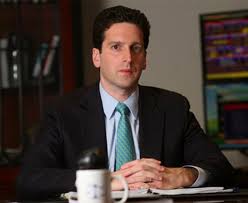Former bitcoin cop won’t help bitcoin companies get licensed

Benjamin Lawsky says he won’t help bitcoin startups navigate the rules he created—a public retort to recent criticism.
When Benjamin Lawsky announced in May that he would step down as New York State’s chief of digital-currency regulation to go into private practice, some people in the bitcoin world rejoiced. Others cried foul.
Overseeing the regulation of digital-currency businesses was just one part of Lawsky’s job as the first superintendent of the state’s Department of Financial Services, created in 2011. But that task became, in the past year, the bulk of the story for Lawsky as he proposed, revised, and finally introduced the first state regulatory policy on digital-currency companies deemed “money-transmitters.” He called it the BitLicense.
The final product did not go over well. Many bitcoin policy pundits and bitcoin startup executives took issue with what they felt was an overreaching set of requirements to get the necessary license. Companies reacted in different ways: Coinbase launched a bitcoin exchange in January that had investment from the New York Stock Exchange, but it is not licensed under BitLicense; Gemini, a forthcoming bitcoin exchange from Cameron and Tyler Winklevoss, has not yet launched because, as the brothers have said, they are waiting until they obtain a license; ShapeShift.io, a site for converting bitcoin to other currencies, shut down service in New York in protest to BitLicense.
At the end of June, with the controversial set of rules as his most recent legacy, Lawsky left office. (His chief of staff Anthony Albanese will serve as acting superintendent for the time being.) The New York Times reported that Lawsky planned to lecture at Stanford University and open his own firm in New York: “He will provide compliance and risk management advice to a range of companies grappling with data breaches and other technological challenges. His clients are likely to include technology companies.”
That sounded, to some, as though Lawsky was planning to leave office, then turn around and consult with startups (likely for big fees) on how to navigate the very rules that he created.
He registered The Lawsky Group in Delaware on June 17, the day after he left office. Bitcoin.com promptly published a passionate piece called “Ben Lawsky’s revolving door” in which it argued, “Lawsky is adding insult to injury by injecting a layer of cronyism into an already depressing regulatory landscape in New York… Lawsky is offering advice on how to deal with the burden that he created. The moral implications of such an action are undoubtedly questionable… Lawsky is making Bitcoin businesses worse off for his own personal gain… With this new consulting firm, the possibility of a cronyist and elitist Bitcoin economy in New York is much more likely to come to fruition.”
Why would the goings-on at the NYDFS matter to those in the business world? Well, if you believe bitcoin entrepreneurs and enthusiasts who insist that their companies have the potential to change banking (and other industries) forever, then the next NYDFS superintendent has a tall task: play watchdog to these startups without limiting their ability to innovate.
Last week, the man who the Times called the “Sheriff of Wall Street” and others called a “bitcoin cop” (Lawsky told Bloomberg last year of his intent to “police Bitcoin”) at last responded to the accusations.
At American Banker‘s digital currencies conference in New York, the magazine’s editor Marc Hochstein asked Lawsky about whether his new firm represented a potential conflict of interest. “What would you say to someone,” Hochstein asked, “who would think that maybe you built yourself a revolving door?”
“I can’t work on anything, for life, I ever worked on [at the NYDFS],” he said, as quoted by Reuters and Coindesk. “I’m doing no work in the virtual currency space,” he added. But the killer sound bite, for those in the bitcoin world, was this:
“If anyone said, ‘I want to hire you to help me get a BitLicense… no can do.”
The statement will not do much to quell critics. On its web site, the Lawsky Group says it “provides in-depth counsel and strategic advice on financial services regulation, cybersecurity and cyber-risk, new financial technologies, compliance, consumer protection, privacy, anti-money laundering controls, crisis management, and investigations in the banking, insurance and other related industries.” Some in the bitcoin community may feel that any work with digital-currency clients at all is a conflict of interest. But for now, Lawsky has at least made it clear he cannot, and will not, work with companies on BitLicense.

